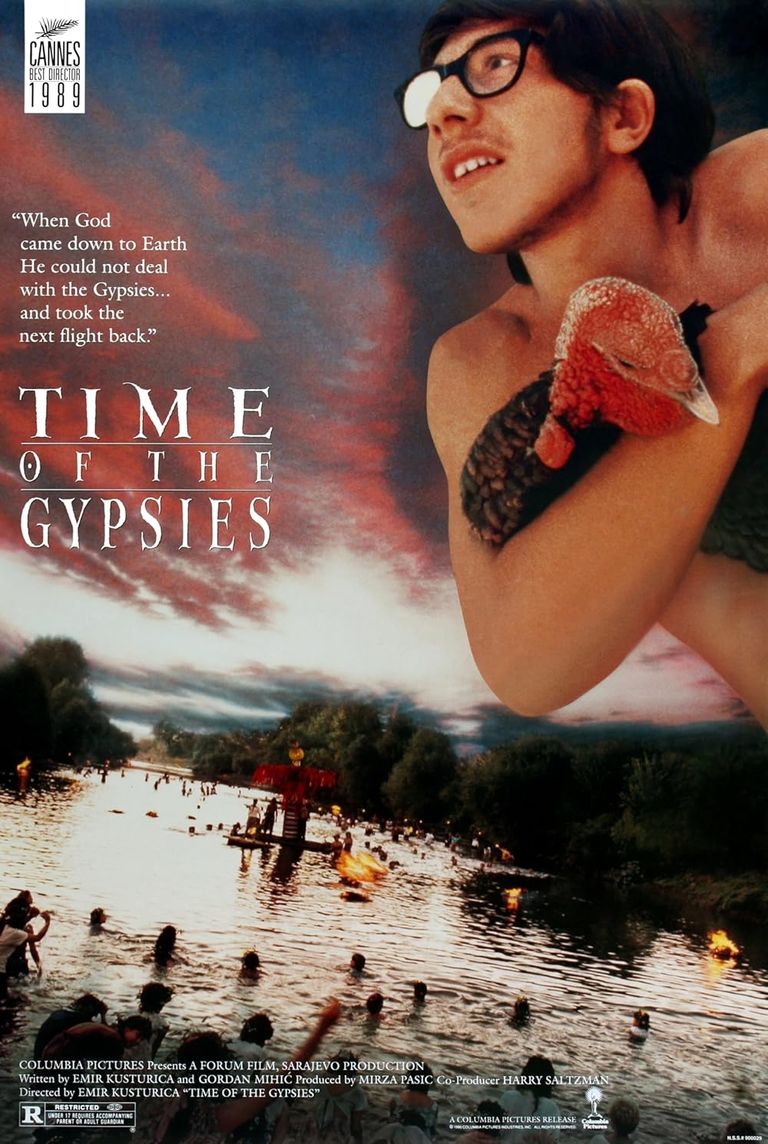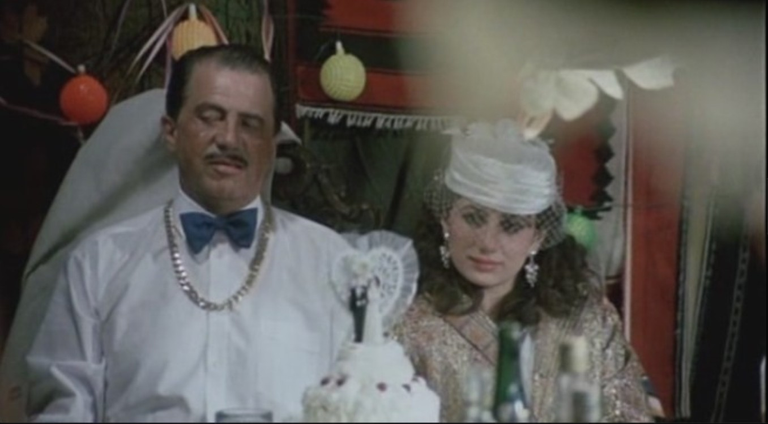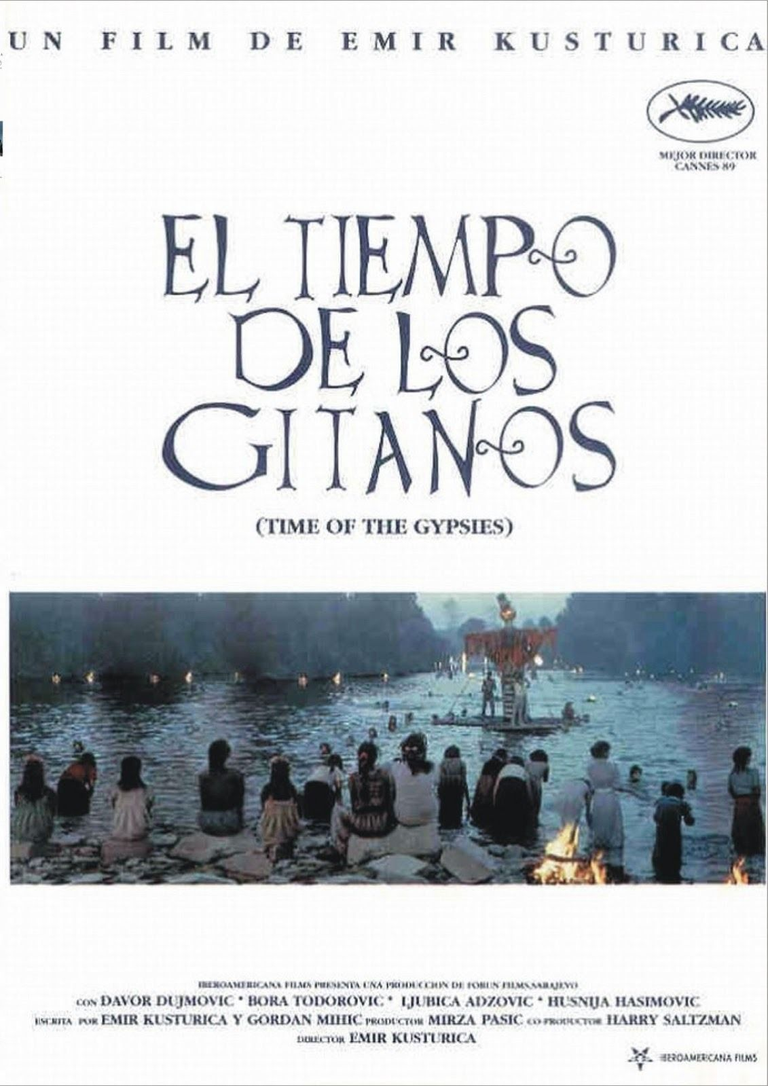
“When God came down to Earth, he met the Gypsies. And he took the first flight back." This is one of the lines spoken by the protagonists of The Time of the Gypsies, a wonderful film by Emir Kusturica. The film tells the adventures of Perhan, a young gypsy who leaves the Balkans and finds himself catapulted to Italy, ending up caught in absurd, painful situations that go far beyond the limits of criminality.
More than two hours long (but the original edition, intended for television, lasted more than twice as long), the film is a coming-of-age novel, the story of a boy in love who discovers first-hand the brutality of the world around him. The trafficking in which he is involved affects human beings: children, disabled people, people whose weaknesses are exploited to take advantage of them without mercy.
The beauty of Kusturica's work, however, lies more in the underlying message than in the plot, in the spectacular madness that guides the characters' actions. The visionary talent of the Serbian director manifests itself in memorable poetry, only surpassed by Underground, which Emir would direct seven years later. It is no coincidence that both films were awarded at Cannes: the first as best director, the most recent – Kusturica's absolute masterpiece – as best film.
Filmed in Sarajevo and Milan, Time of the Gypsies tells the story of a young gypsy, Perhan. The boy finds himself in the hands of a gang of criminals who traffic in human beings in Yugoslavia before the dissolution of the Titoist republic. The protagonists end up in the middle of Milanese petty crime.
Time of the Gypsies is the first cinematic encounter between Kusturica and Bregovic, who creates a passionate and magical score. The soundtrack is less well-known than that of the aforementioned Underground, but it is not at all different. The most beautiful melodies are the slow and dreamy ones, which even take on epic tones in the moving Ederlezi.
Along with Bregovic's pieces, what we remember most about the film is the surreal atmosphere that permeates it: a predictable "trademark" in Kusturica, but which - unlike his other films, especially Life is a Miracle (2004) - in this case is never evident, because it is not extravagance as an end in itself, but the madness that serves to tell and enchant.
If we had to save only one Kusturica film, it would definitely be Underground; but if we had to choose the most magical, the most delicate, the sweetest, we would point to The Time of the Gypsies - difficult to watch for those who do not love Kusturica, fantastic for those who adore him, and perhaps a little disappointed by his more recent works.

“Cuando Dios bajó a la Tierra, se encontró con los gitanos. Y tomó el primer vuelo de regreso". Es una de las frases pronunciadas por los protagonistas de El tiempo de los gitanos, una maravillosa película de Emir Kusturica La película cuenta las aventuras de Perhan, un joven gitano que abandona los Balcanes y se ve catapultado a Italia. terminando atrapados en situaciones absurdas, dolorosas y mucho más allá del límite de la criminalidad.
Con más de dos horas de duración (pero la edición original, destinada a la televisión, duró más del doble), la película es una novela sobre la mayoría de edad, la historia de un chico enamorado que descubre de primera mano la brutalidad del mundo que lo rodea. a él. La trata en la que se ve envuelto afecta a seres humanos: niños, personas discapacitadas, personas cuyas debilidades son explotadas para sacar provecho de ellas sin piedad.
La belleza de la obra de Kusturica, sin embargo, reside más en el mensaje subyacente que en la trama, en la espectacular locura que guía las acciones de los personajes. El talento visionario del director serbio se manifiesta en una poesía memorable, sólo superada por la de Underground, que Emir dirigirá siete años después. No es casualidad que ambas películas fueran premiadas en Cannes: la primera como mejor director, la más reciente –la obra maestra absoluta de Kusturica– como mejor película.
Filmada en Sarajevo y Milán, El tiempo de los gitanos cuenta la historia de un joven gitano, Perhan. El niño se encuentra en manos de una banda de criminales que trafican con seres humanos en Yugoslavia antes de la disolución de la república titoísta. Los protagonistas acabarán en el medio de la pequeña delincuencia milanesa.
El tiempo de los gitanos es el primer encuentro cinematográfico entre Kusturica y Bregovic, que firma una música apasionante y llena de magia. La banda sonora es menos conocida que la del mencionado Underground, pero no es en absoluto diferente. Las melodías más bellas son las lentas y soñadoras, que incluso adquieren tonos épicos en el conmovedor Ederlezi.
Junto a las piezas de Bregovic, lo que más recordamos de la película es la atmósfera surrealista que la impregna: una "marca" predecible en Kusturica, pero que -a diferencia de sus otras películas, sobre todo La vida es un milagro (2004)- en este caso Nunca es evidente, porque no es la extravagancia como fin en sí misma, sino la locura que sirve para contar y encantar.
Si tuviéramos que salvar solo una película de Kusturica, definitivamente sería Underground; pero si tuviéramos que elegir el más mágico, el más delicado, el más dulce, indicaríamos La época de los gitanos –difícil de ver para quien no ama a Kusturica, fantástico para quien lo adora, y tal vez un poco decepcionado por sus trabajos más recientes.

Perhan is the son of a soldier and a deceased gypsy woman, but he was raised by his grandmother. The latter, a member of the gypsy community in Yugoslavia, leads an impeccable life and has instilled in her grandson a great sense of honesty. Despite everything, Ahmed, one of the richest gypsies in the community, will induce Perhan to deceive, beg and steal. The teenager's ambitions to escape the misery that surrounds him will lead him to enter into organized crime.
After the critical success achieved with 'Dad is on a Business Trip', the Bosnian director Emir Kusturica confirmed his prestige with this film, thanks to which he won the award for best director at the Cannes Film Festival. The film, spoken in dialect and performed by non-professional actors, offers a particular vision of the trafficking of gypsy children between Yugoslavia and Italy and the commercialization of begging. In it, Kusturica more openly cultivates a register that alternates the real with the dreamlike or fantastic and comedy with tragedy.

Perhan es hijo de un soldado y de una mujer gitana ya fallecida, pero se ha criado con su abuela. Ésta, perteneciente a la comunidad gitana de Yugoslavia, lleva una vida intachable y ha inculcado a su nieto un gran sentido de la honestidad. A pesar de todo, Ahmed, uno de los gitanos más ricos de la comunidad, inducirá a Perhan al engaño, la mendicidad y el robo. Las ambiciones del adolescente por salir de la miseria que le rodea le llevarán a iniciarse en la delincuencia organizada.
Después del éxito de crítica conseguido con 'Papá está de viaje de negocios', el realizador bosnio Emir Kusturica avaló su prestigio con esta cinta, gracias a la cual obtuvo el galardón al mejor director en el Festival de Cannes. La cinta, hablada en dialecto e interpretada por actores no profesionales, ofrece una particular visión acerca del tráfico de niños gitanos entre Yugoslavia e Italia y la comercialización con la mendicidad. En ella, Kusturica cultiva más abiertamente un registro que alterna lo real con lo onírico o fantástico y la comedia con la tragedia.

English:Davor Dujmovic: Perhan
Bora Todorovic: Ahmed
Ljubica Adzovic: Khaditza (grandmother)
Husnija Hasimovic: Merdzan (uncle)
Sinolicka Trpkova: Azra (girlfriend)
Zabit Memedov: Zabit
Elvira Sali: Danira (sister)
Suada Karisik: Dzamila
Sedrije Halim: Ruza, Azra's mother

Davor Dujmovic: Perhan
Bora Todorovic: Ahmed
Ljubica Adzovic: Khaditza (abuela)
Husnija Hasimovic: Merdzan (tío)
Sinolicka Trpkova: Azra (novia)
Zabit Memedov: Zabit
Elvira Sali: Danira (hermana)
Suada Karisik: Dzamila
Sedrije Halim: Ruza, madre de Azra

Kusturica started out with the idea of making a film about the Doukhobors, a Russian minority living in Canada, but changed his mind after reading in a newspaper that a Roma family had sold a newborn baby in Italy. To develop the story, the director spent two months visiting the Roma community in Skopje (where he later shot the first part of the film), learning about Roma culture and hearing stories from people, which he then used to write the script. During these inspections, 120 Roma were also selected, some of whom were chosen to play important roles in the film. In particular, the protagonist's grandmother Baba, Uncle Merdzan and the neighbour Zabit. The protagonist Perhan, on the other hand, is played by the young actor who had already worked with Kusturica in Father on Business. The film was staged in Roma and Yugoslav.
As the film was shot in the Roma reality, new scenes were continually invented and improvised, which led to a much larger amount of footage than originally planned in the script. Much material was then removed during the editing phase, but Sarajevo television decided to make a six-episode miniseries with a total duration of almost five hours, which was not made directly by Kusturica but for which he gave his consent.

Kusturica empezó con la idea de hacer una película sobre los Doukhobors, una minoría rusa que vive en Canadá, pero cambió de opinión tras leer en un periódico que una familia gitana había vendido un bebé recién nacido en Italia. Para desarrollar la historia, el director visitó durante dos meses la comunidad gitana de Skopje (donde luego rodó la primera parte de la película), conociendo la cultura gitana y haciendo que le contaran historias que luego utilizó para escribir el guión. Durante estas inspecciones también fueron seleccionados 120 gitanos, algunos de los cuales fueron elegidos para desempeñar papeles importantes en la película. En particular, la abuela del protagonista, Baba, el tío Merdzan y el vecino Zabit. El protagonista Perhan, en cambio, es interpretado por el joven actor que ya había trabajado con Kusturica en Papá en viaje de negocios. La película se representó en romaní y yugoslavo.
Al rodar la película dentro de la realidad gitana, continuamente se inventaron e improvisaron nuevas escenas, lo que llevó a disponer de una cantidad de metraje mucho mayor de lo previsto inicialmente en el guión. Luego se eliminó mucho material durante la fase de montaje, pero la televisión de Sarajevo decidió realizar una miniserie de seis episodios con una duración total de casi cinco horas, que no fue realizada directamente por Kusturica pero para la que éste dio su consentimiento.

Source images / Fuente imágenes: IMDB.


Sources consulted (my property) for the preparation of this article. Some paragraphs may be reproduced textually.
Fuentes consultadas (de mi propiedad) para la elaboración del presente artículo. Algunos párrafos pueden estar reproducidos textualmente.
| Argentina Discovery. |  |
|---|---|
| Galería Fotográfica de Argentina. |  |
| Viaggio in Argentina. |  |
| Patagonia Express. |  |

Upvoted. Thank You for sending some of your rewards to @null. Get more BLURT:
@ mariuszkarowski/how-to-get-automatic-upvote-from-my-accounts@ blurtbooster/blurt-booster-introduction-rules-and-guidelines-1699999662965@ nalexadre/blurt-nexus-creating-an-affiliate-account-1700008765859@ kryptodenno - win BLURT POWER delegationNote: This bot will not vote on AI-generated content
Thanks @ctime!